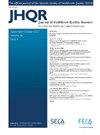Adecuación del consentimiento informado en la investigación clínica: estudio descriptivo transversal
IF 1
Q4 HEALTH CARE SCIENCES & SERVICES
引用次数: 0
Abstract
Introduction and objectives
The principle of patient autonomy in the participation and incorporation of their health data in research projects is a legal and deontological obligation that must be fulfilled. The aim of this study was to know the degree of compliance and adequacy of informed consent in clinical research projects in a university hospital.
Material and methods
Through this cross-sectional study, the adequacy of the way patient data are obtained in the research projects presented to the Research Committee of a university hospital was analyzed. The adequacy of the way patient data were obtained in the research projects, dealing with informed consent and causes of exemption, was described with their frequencies distributions. It was assessed by means of the adjusted odds ratio through a backstep logistic regression model, including the predictable significant variables previously analyzed in the univariant analysis.
Results
A total of 565 protocols were included. The most frequent type of studies assessed were observational retrospectives (49.6%) and end-of-year projects (28.1%). The most frequent way of obtaining the patient data were by means of soliciting exemption of informed consent (48.3%). Obtaining the patient data process was considered appropriated in 51.1% of the projects. Projects with higher adequacy were those solicited by students (OR = 4.2; CI95% = 2.0–8.8) and residents OR = 3.0; CI95% = 1.2–2.4).
Conclusions
The majority of the projects assessed was retrospective observational studies in which exemption of informed consent was solicited. Projects with higher adequacy were solicited by students and residents.
临床研究中知情同意的充分性:一项描述性横断面研究。
前言和目标:病人自主参与和将其健康数据纳入研究项目的原则是一项必须履行的法律和道义义务。本研究旨在了解某大学医院临床研究项目中知情同意的遵守程度和充分性。材料和方法:通过本横断面研究,分析了在提交给某大学医院研究委员会的研究项目中获取患者数据的方式是否充分。在研究项目中获得患者数据的方式的充分性,处理知情同意和豁免的原因,描述了它们的频率分布。通过回溯逻辑回归模型,包括先前在单变量分析中分析的可预测的显著变量,通过调整的优势比进行评估。结果:共纳入565个方案。最常见的研究类型是观察性回顾性研究(49.6%)和年终项目(28.1%)。获取患者数据最常见的方式是请求豁免知情同意(48.3%)。51.1%的项目认为获得患者数据过程是适当的。充足性较高的项目是由学生征集的项目(OR=4.2;CI95%=2.0-8.8),居民OR=3.0;CI95% = 1.2 - -2.4)。结论:大多数被评估的项目是回顾性观察性研究,在这些研究中,要求受试者豁免知情同意。由学生及居民征集适当度较高的项目。
本文章由计算机程序翻译,如有差异,请以英文原文为准。
求助全文
约1分钟内获得全文
求助全文
来源期刊

Journal of Healthcare Quality Research
Medicine-Health Policy
CiteScore
1.70
自引率
8.30%
发文量
83
审稿时长
57 days
期刊介绍:
Revista de Calidad Asistencial (Quality Healthcare) (RCA) is the official Journal of the Spanish Society of Quality Healthcare (Sociedad Española de Calidad Asistencial) (SECA) and is a tool for the dissemination of knowledge and reflection for the quality management of health services in Primary Care, as well as in Hospitals. It publishes articles associated with any aspect of research in the field of public health and health administration, including health education, epidemiology, medical statistics, health information, health economics, quality management, and health policies. The Journal publishes 6 issues, exclusively in electronic format. The Journal publishes, in Spanish, Original works, Special and Review Articles, as well as other sections. Articles are subjected to a rigorous, double blind, review process (peer review)
 求助内容:
求助内容: 应助结果提醒方式:
应助结果提醒方式:


